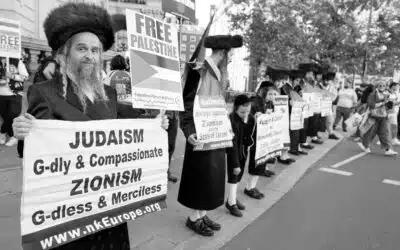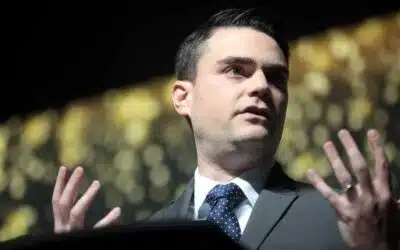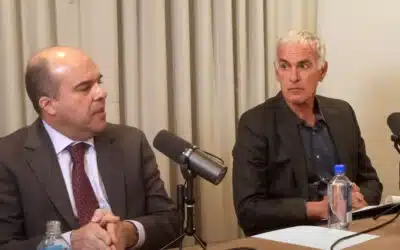The final report of the 9/11 Commission assured us that “To date, the U.S. government has not been able to determine the origin of the money used for the 9/11 attacks.”
One might be inclined to think that the inability to track the money trail to the parties responsible for financing the terrorist attacks was a significant failure in the investigation, were it not that the report also assures us that “the question” of who funded the operations “is of little practical significance.”
The report then adds, perhaps somewhat superfluously, that “we have seen no evidence that any foreign government—or foreign government official—supplied any funding” of the attacks.[1]
And thus we are encouraged to put our minds at ease and forget about the matter. Nothing to see here. Move along.
Of course, “the question” of who financed the hijackers trail wasn’t always considered to be “of little practical significance.” Immediately following the September terrorist attacks, the financial evidence was regarded as “the ‘smoking gun’ linking Osama bin Laden to the September 11 terrorist attacks”, “hard evidence which will be crucial in the continuing effort to maintain an international coalition behind the US-led military effort once fighting starts”[2], a “key link to bin Laden as the mastermind of the overall plot.”[3]
On October 1, CNN reported that, according to law enforcement sources, “As much as $100,000 was wired in the past year from Pakistan to Mohamed Atta, the suspected leader of the terrorist hijackings…”[4] The Guardian reported that “The man at the centre of the financial web is believed to be Sheikh Saeed, also known as Mustafa Mohamed Ahmad…”[5] CNN followed up several days later, confirming the multiple identities of Sheikh Saeed (spelled “Sheik Syed” and “Mustafa Muhammed Ahmad” by CNN), a terrorist who had been released from prison in India after an Indian Airlines flight had been hijacked to obtain his release.[6]
But then the investigation of the financial evidence took an unforeseen turn.
The Press Trust of India reported that the money trail led directly to the chief of Pakistan’s intelligence agency. The Pakistani paper Dawn picked up the story and reported on October 8 that “Director General of Pakistan’s Inter-Services Intelligence (ISI) Lt Gen Mahmud Ahmed has been replaced after the FBI investigators established credible links between him and Umar Sheikh…” The paper added that “Informed sources said there were enough indications with the US intelligence agencies that it was at Gen Mahmud’s instruction that Sheikh had transferred 100,000 US dollars into the account of Mohammed Atta…”[7]
The Times of India reported on the 9th that “The US authorities sought his removal after confirming the fact that $100,000 were wired to WTC hijacker Mohammed Atta from Pakistan by Ahmad Umar Sheikh at the instance of Gen Mahmud.”[8]
Agence France-Presse picked up the story on the 11th and inquired further, reporting that “A highly-placed government source told AFP that the ‘damning link’ between the general and the transfer of funds to Atta was part of evidence which India has officially sent to the US.”[9]
If one could point to a clear point in time at which “the question” of who financed the 9/11 operations went from “smoking gun” to being “of little practical significance”, then this was clearly it.
Mahmud Ahmed was quietly replaced as head of the ISI, and the story that he had “resigned” was propagated[10] In an alternative version, Mahmud was fired from his post as a show from Musharraf demonstrating his willingness to weed out radical elements from his government in support of the US “war on terrorism”. For instance, in his book Bush at War, Bob Woodward writes that on October 8, CIA director George Tenet “was happy. Musharraf had dismissed his intelligence chief, Mahmoud, and several of his key lieutenants, a dramatic signal. The bad witch was dead. The Pakistani intelligence service had been the Taliban’s sugar daddy, and the removal of Mahmoud meant that Musharraf was increasingly serious.”[11] This is the accepted version of events, repeated elsewhere.
With the exception of two short pieces appearing in the online Opinion Journal (from The Wall Street Journal), the first on the 9th relaying the story that had appeared in Dawn, and again on the 10th relaying the Times of India report, not a word of the startling revelation was uttered in the US media.[12] The charges of ISI collaboration with the 9/11 terrorists was met with near total silence, the only exceptions being various online publications, blogs, and perhaps a few alternative independent media outlets.
As a thought experiment, one might easily imagine what the reaction might have been from the major media in the US had it been reported in the international press that the head of Iraq’s intelligence had been responsible for financing the 9/11 terrorists.
The “question” of the money trail did come up at a press conference with National Security Advisor Condoleezza Rice on May 16, 2002, when a foreign journalist asked about the ISI chief and the transferring of funds to the terrorists:
Q Dr. Rice, are you aware of the reports at the time – was in Washington on September 11th, and on September 10th, $100,000 was wired to Pakistan to this group here in the area? While he was here meeting with you or anybody in the administration?
DR. RICE: I have not seen that report, and he was certainly not meeting with me.[13]
The lady doth protest too much, methinks. Incidentally, the above is how the transcript of the conference reads on the White House website, “ISI chief” having been excised from the reporter’s question—words that can clearly be heard in the audio from the briefing.[14]
The conclusion from all this is fairly self-evident. The “question” of the money trail only has “significance” if it leads in the right direction, but becomes “of little significance” if it leads to the wrong people. Of course, if we reject this criterion, the obvious question arises.
Perhaps unwittingly, Deputy Assistant Director of the FBI’s Counterterrorism Division, John S. Pistole, raised that question again in July 2003, when he told a Senate panel that investigators had “traced the origin of the funding of 9/11 back to financial accounts in Pakistan, where high-ranking and well-known al-Qaida operatives played a major role in moving the money forward, eventually into the hands of the hijackers located in the U.S.”[15]
The Pakistani weekly, the Friday Times, might possibly have provided another piece of the puzzle earlier this month. The magazine reported a “disclosure” that “sheds doubt on the integrity and honesty of the members of the 9/11 inquiry commission and, above all, the authenticity of the information in their final report”. The Telegraph of India, which picked up the story, reported that “The Pakistan foreign office had paid tens of thousands of dollars to lobbyists in the US to get anti-Pakistan references dropped from the 9/11 inquiry commission report, The Friday Times has claimed. The Pakistan weekly said its story is based on disclosures made by foreign service officials to the Public Accounts Committee at a secret meeting in Islamabad on Tuesday.”[16]
According to the Friday Times story, the 9/11 Commission report had “left out some information relating to Pakistan because the commission’s members were paid by Pakistan to prevent them from including damaging information”.[17]
A piece in the Hindustan Times, commenting on the report “by one of Pakistan’s most respectable publications”, astutely observed that “One of the more controversial elements that was not probed [by the 9/11 Commission] was the charge, first reported in the media in October 2001, that the ISI chief Mahmoud Ahmed was behind the $100,000 transferred by Umar Sheikh to Mohammed Atta, leader of the hijackers who crashed their aircraft into the World Trade Center in New York and the Pentagon in Washington DC.”[18]
Indeed, this report had, far from being buried in the bowels of the US intelligence community, long been widely disseminated on the internet. It seems inconceivable that the 9/11 Commission was not confronted with the allegation that the head of Pakistan’s Inter-Services Intelligence (ISI) was responsible for financing the terrorist attacks. It seems likewise inconceivable that had they investigated the allegation and found it unsubstantiated, that they would have failed to present this finding in their final report.
Hence, whether the allegations of bribery are true or not, there are strong indications that the 9/11 Commission was actively involved in a cover-up of information that might otherwise have proved altogether inconvenient for certain policies of he Bush administration in the so-called “war on terrorism”.
There’s another curiosity, just a footnote. On the morning of September 11, 2001, Mahmud Ahmed was in Washington, D.C., where he had spoken with Secretary of State Colin L. Powell and met with CIA Director George Tenet, Deputy Secretary of State Richard L. Armitage, Chairman of the Senate Foreign Relations Committee Senator Joseph Biden, US Under Secretary of State for Political Affairs Mark Grossman, Chairman of the Senate Intelligence Committee Senator Bob Graham, and Chairman of the House Intelligence Committee Porter Goss.[19]
In fact, Mahmud, who, according to the Washington Post, “ran a spy agency notoriously close to Osama bin Laden and the Taliban”, was having breakfast with Graham and Goss, who had both traveled to Pakistan several weeks prior, on the morning of the 11th when the attacks occurred.[20]
Graham and Goss would subsequently become the chairmen of the 9/11 Joint Inquiry. Perhaps needless to say, their report was silent on the matter in question.
The report of the 9/11 Commission, of course, as we have already observed, simply followed suit.
Notes
[1]The 9/11 Commission Report: Final Report of the National Commission on Terrorist Attacks Upon the United States (W.W. Norton and Company, New York) p. 172
[2] Julian Borger and John Hooper, “Trail links Bin Laden aide to hijackers”, The Guardian, October 1, 2001
https://www.guardian.co.uk/wtccrash/story/0,1300,561001,00.html
[3] “Suspected hijack bankroller freed by India in ’99”, CNN, October 6, 2001
https://www.cnn.com/2001/US/10/05/inv.terror.investigation/
[4] “Sources: Suspected terrorist leader was wired funds through Pakistan”, CNN, October 1, 2001
https://www.cnn.com/2001/US/10/01/inv.pakistan.funds/
[5] Julian Borger and John Hooper, “Trail links Bin Laden aide to hijackers”, The Guardian, October 1, 2001
https://www.guardian.co.uk/wtccrash/story/0,1300,561001,00.html
[6] “Suspected hijack bankroller freed by India in ’99”, CNN, October 6, 2001
https://www.cnn.com/2001/US/10/05/inv.terror.investigation/
[7] “Gen Mahmud’s exit due to links with Umar Sheikh”, Dawn (Pakistan), October 8, 2001
https://www.dawn.com/2001/10/09/top13.htm
[8] “India helped FBI trace ISI-terrorist links”, The Times of India, October 9, 2001
https://timesofindia.indiatimes.com/articleshow/1454238160.cms
[9] “India Accuses Ex Pakistan Spy Chief Of Links to US Attacker: Report”, Agence France-Presse, October 10, 2001
https://www.cooperativeresearch.org/timeline/2001/afp101001.html
[10] “Pak confirms ISI chief replaced”, The Times of India, October 9, 2001
https://timesofindia.indiatimes.com/articleshow/1454746255.cms
[11] Bob Woodward, Bush at War (New York: Simon & Schuster, 2002) p. 212
[12] To the best of this author’s knowledge, no other mention of the story was made in any major US media, although it was disseminated in online publications, such as the Center for Research on Globalization, blogs, and alternative US media outlets.
James Taranto, “Our Friends the Pakistanis”, Opinion Journal, October 9, 2001
https://opinionjournal.com/best/?id=95001294#isi
James Taranto, “Our Friends the Pakistanis”, Opinion Journal, October 10, 2001
https://www.opinionjournal.com/best/?id=95001298
[13] Press Briefing by National Security Advisor Dr. Condoleezza Rice, The White House, May 16, 2002
https://www.whitehouse.gov/news/releases/2002/05/20020516-13.html
[14] The video of the press conference is presently still available online. The reporter’s question comes just after 31 minutes into the video, and “ISI chief” can clearly be heard:
https://www.whitehouse.gov/news/releases/2002/05/20020516-13.v.smil
[15] John J. Lumpkin, “Investigators trace 9-11 funding to accounts in Pakistan”, Associated Press, July 31, 2003
https://www.sfgate.com/cgi-bin/article.cgi?file=/news/archive/2003/07/31/national2024EDT0765.DTL
[16] “Pakistan weekly spills 9/11 beans”, The Telegraph (India), March 13, 2006
https://www.telegraphindia.com/1060313/asp/nation/story_5962372.asp
[17] “Thousands of dollars spent by Pak to get 9/11 findings dropped”, Zee News, March 19, 2006
https://www.zeenews.com/articles.asp?aid=282600&sid=SAS&ssid=
[18] PN Khera, “Back to Islamabad”, Hindustan Times, March 23, 2006
https://www.hindustantimes.com/news/181_1656576,00120002.htm
[19] Jane Perlez, “Powell Says It Clearly: No Middle Ground On Terrorism”, The New York Times, September 13, 2001
https://www.hindustantimes.com/news/181_1656576,00120002.htm
[20] “Bush gives historic scope to attacks”, The Associated Press, September 13, 2001
https://select.nytimes.com/gst/abstract.html?res=F70A10F7385C0C708DDDA00894D9404482
[21] Frank Davies, “Pakistan Will Struggle To Keep Commitment, Lawmakers Say”, The Miami Herald, September 16, 2001
https://www.cooperativeresearch.org/timeline/2001/miamiherald091601.html
Amir Mateen, “ISI Chief’s Parleys continue in Washington”, The News International (Pakistan), September 10, 2001
https://www.jang.com.pk/thenews/index.html
[20] Richard Leiby, “A Cloak But No Dagger”, The Washington Post, May 18, 2002
https://www.washingtonpost.com/ac2/wp-dyn/A36091-2002May17?language=printer
James Risen, “Rifts Plentiful as 9/11 Inquiry Begins”, The New York Times, June 3, 2002
https://www.nytimes.com/2002/06/04/politics/04INQU.html?todaysheadlines
Jake Tapper, “Spying eyes and ears”, Salon, September 14, 2001
https://dir.salon.com/politics/feature/2001/09/14/human_spies/index.html
“Congressional Action”, PBS NewsHour, September 14, 2001
https://www.pbs.org/newshour/bb/terrorism/july-dec01/congress_9-14.html
Frank Davies, “Pakistan Will Struggle To Keep Commitment, Lawmakers Say”, The Miami Herald, September 16, 2001
https://www.cooperativeresearch.org/timeline/2001/miamiherald091601.html


